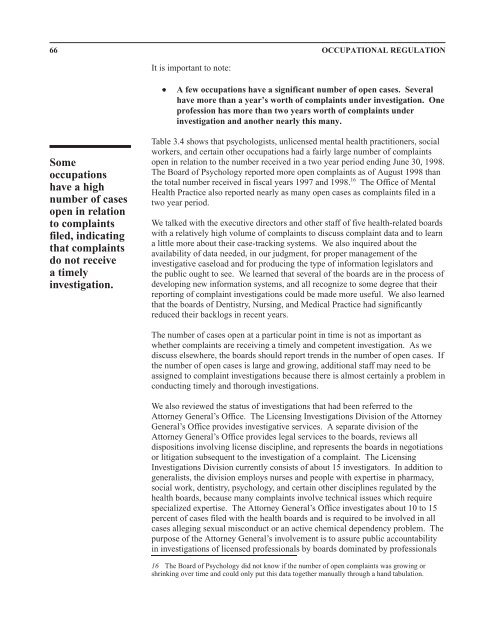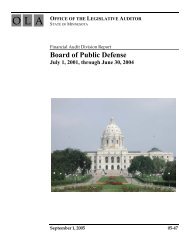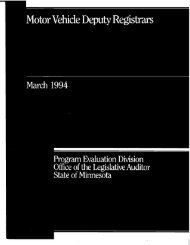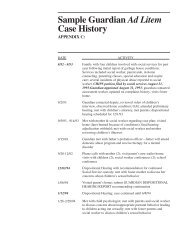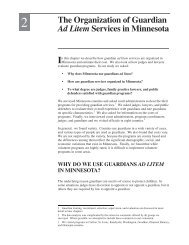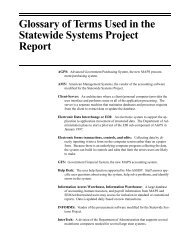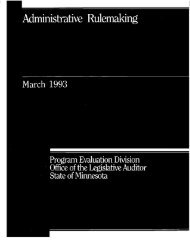Occupational Regulation - Office of the Legislative Auditor
Occupational Regulation - Office of the Legislative Auditor
Occupational Regulation - Office of the Legislative Auditor
Create successful ePaper yourself
Turn your PDF publications into a flip-book with our unique Google optimized e-Paper software.
66 OCCUPATIONAL REGULATION<br />
It is important to note:<br />
· A few occupations have a significant number <strong>of</strong> open cases. Several<br />
have more than a year’s worth <strong>of</strong> complaints under investigation. One<br />
pr<strong>of</strong>ession has more than two years worth <strong>of</strong> complaints under<br />
investigation and ano<strong>the</strong>r nearly this many.<br />
Some<br />
occupations<br />
have a high<br />
number <strong>of</strong> cases<br />
open in relation<br />
to complaints<br />
filed, indicating<br />
that complaints<br />
do not receive<br />
a timely<br />
investigation.<br />
Table 3.4 shows that psychologists, unlicensed mental health practitioners, social<br />
workers, and certain o<strong>the</strong>r occupations had a fairly large number <strong>of</strong> complaints<br />
open in relation to <strong>the</strong> number received in a two year period ending June 30, 1998.<br />
The Board <strong>of</strong> Psychology reported more open complaints as <strong>of</strong> August 1998 than<br />
<strong>the</strong> total number received in fiscal years 1997 and 1998. 16 The <strong>Office</strong> <strong>of</strong> Mental<br />
Health Practice also reported nearly as many open cases as complaints filed in a<br />
two year period.<br />
We talked with <strong>the</strong> executive directors and o<strong>the</strong>r staff <strong>of</strong> five health-related boards<br />
with a relatively high volume <strong>of</strong> complaints to discuss complaint data and to learn<br />
a little more about <strong>the</strong>ir case-tracking systems. We also inquired about <strong>the</strong><br />
availability <strong>of</strong> data needed, in our judgment, for proper management <strong>of</strong> <strong>the</strong><br />
investigative caseload and for producing <strong>the</strong> type <strong>of</strong> information legislators and<br />
<strong>the</strong> public ought to see. We learned that several <strong>of</strong> <strong>the</strong> boards are in <strong>the</strong> process <strong>of</strong><br />
developing new information systems, and all recognize to some degree that <strong>the</strong>ir<br />
reporting <strong>of</strong> complaint investigations could be made more useful. We also learned<br />
that <strong>the</strong> boards <strong>of</strong> Dentistry, Nursing, and Medical Practice had significantly<br />
reduced <strong>the</strong>ir backlogs in recent years.<br />
The number <strong>of</strong> cases open at a particular point in time is not as important as<br />
whe<strong>the</strong>r complaints are receiving a timely and competent investigation. As we<br />
discuss elsewhere, <strong>the</strong> boards should report trends in <strong>the</strong> number <strong>of</strong> open cases. If<br />
<strong>the</strong> number <strong>of</strong> open cases is large and growing, additional staff may need to be<br />
assigned to complaint investigations because <strong>the</strong>re is almost certainly a problem in<br />
conducting timely and thorough investigations.<br />
We also reviewed <strong>the</strong> status <strong>of</strong> investigations that had been referred to <strong>the</strong><br />
Attorney General’s <strong>Office</strong>. The Licensing Investigations Division <strong>of</strong> <strong>the</strong> Attorney<br />
General’s <strong>Office</strong> provides investigative services. A separate division <strong>of</strong> <strong>the</strong><br />
Attorney General’s <strong>Office</strong> provides legal services to <strong>the</strong> boards, reviews all<br />
dispositions involving license discipline, and represents <strong>the</strong> boards in negotiations<br />
or litigation subsequent to <strong>the</strong> investigation <strong>of</strong> a complaint. The Licensing<br />
Investigations Division currently consists <strong>of</strong> about 15 investigators. In addition to<br />
generalists, <strong>the</strong> division employs nurses and people with expertise in pharmacy,<br />
social work, dentistry, psychology, and certain o<strong>the</strong>r disciplines regulated by <strong>the</strong><br />
health boards, because many complaints involve technical issues which require<br />
specialized expertise. The Attorney General’s <strong>Office</strong> investigates about 10 to 15<br />
percent <strong>of</strong> cases filed with <strong>the</strong> health boards and is required to be involved in all<br />
cases alleging sexual misconduct or an active chemical dependency problem. The<br />
purpose <strong>of</strong> <strong>the</strong> Attorney General’s involvement is to assure public accountability<br />
in investigations <strong>of</strong> licensed pr<strong>of</strong>essionals by boards dominated by pr<strong>of</strong>essionals<br />
16 The Board <strong>of</strong> Psychology did not know if <strong>the</strong> number <strong>of</strong> open complaints was growing or<br />
shrinking over time and could only put this data toge<strong>the</strong>r manually through a hand tabulation.


